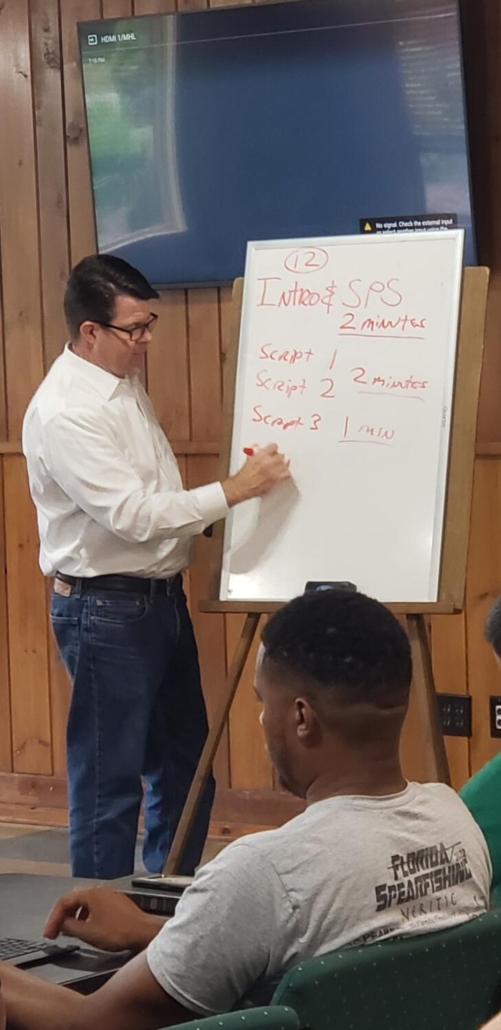 The sermonette is an important portion of the Sabbath service. The song-leader’s role is, in part, to assist the congregation with the transition from the “active mode” into “listening mode.” Our members can often have a hectic morning with all the effort it takes to get to services. When they arrive, they may go right into active fellowshipping, enjoying the company of their fellow brethren. The song-leader helps the congregation move from the “active” into the “listening” stage.
The sermonette is an important portion of the Sabbath service. The song-leader’s role is, in part, to assist the congregation with the transition from the “active mode” into “listening mode.” Our members can often have a hectic morning with all the effort it takes to get to services. When they arrive, they may go right into active fellowshipping, enjoying the company of their fellow brethren. The song-leader helps the congregation move from the “active” into the “listening” stage.
On the other hand, the sermonette speaker is approaching an audience that is ready to listen and learn. As the sermonette speaker steps behind the lectern, he has an opportunity to address an audience that is “fresh”. Our brethren have come great distances to worship God and learn from His Word. We have an obligation to do our best not to disappoint them with the spiritual instruction that we give them.
The sermonette, then, should fulfill the following expectations…
It should relay God’s mind – not our own opinion.
Job 15:8 Have you heard the counsel of God? Do you limit wisdom to yourself?
If we speak about ideas that have occurred to us, they might be profitable, and they might not! The importance of searching God’s Word for the kernels of truth that we will present to our brethren cannot be underestimated. Thoughts may occur to us that may seem to be perfect for a sermonette, but the litmus test is whether God’s Word makes this point. If not, we’re on shaky ground. If we try to line up scriptures to support OUR point, we’re going about the process in the wrong way. Our job is not to prove OUR point, it is to point our brethren to God’s point. God’s point of view is what we’re after, and its what the congregation wants to hear.
It should instruct.
Pro 1:2 -3 …To know wisdom and instruction, To perceive the words of understanding,
To receive the instruction of wisdom, Justice, judgment, and equity;
We have the humbling responsibility to instruct our brethren. Therefore, our role as a sermonette speaker is not to entertain, to impress, to criticize, or to hypothesize. Using props can be helpful, but props can blur the message if we’re not careful. Stories and anecdotes can be effective, but only if they don’t overshadow the scriptural message. We don’t need to impress the congregation. It is the Word of God that is described as “sharp” (Hebrews 4:12), not the vast depth of our intellectual ability. The role of the sermonette speaker should not be to criticize or correct the congregation, or even more importantly, individual members in the congregation. We can easily fall into the trap of seeing a particular weakness in a member, and think, “this would be a good sermonette topic.” Bad idea! If you feel the need to go to your brother about a fault, don’t do it in front of the congregation, standing behind the comfortable protection of a lectern! And using the sermonette as a platform to promote our own theories and conjecture with the perceived endorsement of the church is not only foolish, but dangerous. In Romans 16:17, Paul said, “Now I urge you, brethren, note those who cause divisions and offenses, contrary to the doctrine which you learned, and avoid them.” Is it really wise to try out our new and different theories and ideas on the church during the sermonette time?
It should be within the parameters set by the tradition of the church.
Proverbs 25:11 A word fitly spoken is like apples of gold in pictures of silver
Brevity is key in a sermonette. The sermonette should be no longer than 12-15 minutes long, and should include 3-5 scriptures. Although this can seem daunting, it is not impossible. Christ was able to accomplish this regularly with the parables that have been recorded for us. In fact, He was able to include the parable and the explanation of it in far less than 12-15 minutes. See Matthew 13 for an example. The effectiveness of our sermonettes will be closely related to our ability to develop the skill of narrowing our focus. Explain the modern-day application a scripture. Teach the correct way to understand a confusing scripture. Illustrate one way to better follow God’s instruction in a particular area of life. Keep it simple for success.
Sermonettes are an important part of the church service. If the sermon is the “main course”, the sermonette is the “hors d’oeurves”. It may be smaller, but it can be equally delicious. Prepared well, it will be an effective part of the menu of spiritual nourishment for God’s Sabbath table.


